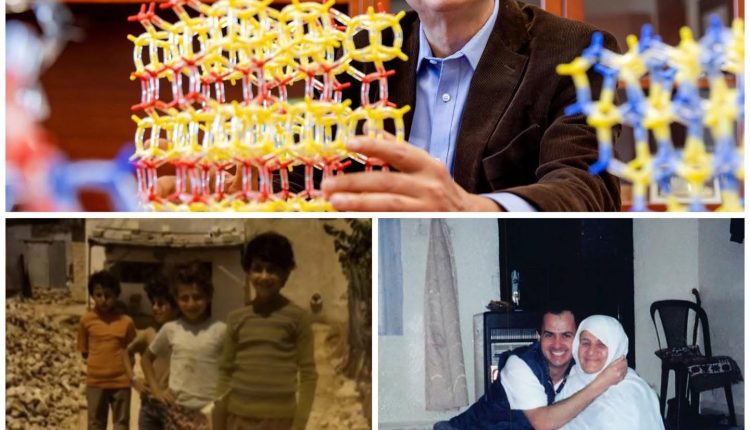من المعاناة مع شح المياه في عمّان إلى ابتكار مادة ثورية قادرة على استخراج المياه من العدم؛ قصة العالم الأردني عمر ياغي الذي فاز اليوم بجائزة نوبل للكيمياء
المرفا….وُلد ياغي في عمّان عام ١٩٦٥ لأسرة لاجئة من أصل فلسطيني، عاشت في بيت مؤلف من غرفة واحدة؛ نصفها لوالديه وتسعة من أشقائه، والنصف الآخر للأبقار. كانت المياه تصلهم مرة كل أسبوعين، فينهض فجراً لفتح الحنفية التي تغذي البيت، وبذلك ترعرع مدركاً للآثار العميقة لشح المياه. درس في مدرسة المطران بجبل عمّان، وكان في طريق عودته إلى منزله في القويسمة يمر على ملحمة والده لمساعدته فيها.
عُرف ياغي بولعه بالقراءة منذ طفولته. أهتمت عائلته كثيراً بتعليمه، فأرسله والده إلى الولايات المتحدة في سن الخامسة عشرة، فنجح رغم ضعف لغته الإنجليزية في البداية. ورغم رغبة والديه بأن يدرس الطب أو الهندسة، تمسك بشغفه بالكيمياء، فحصل على الدكتوراه فيها من جامعة إلينوي عام ١٩٩٠. في عام ١٩٩٥، ابتكر مادة جديدة هي الأطر المعدنية العضوية (MOFs)، لتُفتتح بذلك حقبة جديدة في الكيمياء عُرفت بالكيمياء الشبكية.
تتميز هذه المواد بقدرتها على ترتيب الجزيئات بطريقة تزيد مساحتها السطحية؛ حتى أن مكعباً بحجم السكر قد يحتوي على مساحة تغطي ملعب كرة قدم. أحد أهم تطبيقاتها هو التقاط بخار الماء من الهواء لإنتاج لترات من المياه، وهو ما دفع ياغي لتأسيس شركة ناشئة لحصاد المياه الجوية عام ٢٠٢٠. يشغل اليوم أعلى مرتبة أكاديمية في جامعة كاليفورنيا – بيركلي، ويُعرف بتعامله مع طلابه كزملاء، مانحاً إياهم الاستقلالية والتشجيع على طرح الأسئلة وتحديه بحرية.
نال ياغي العديد من الجوائز العالمية، لكن مسيرته توّجت اليوم بفوزه بجائزة نوبل للكيمياء إلى جانب عالمين ياباني وبريطاني بسبب عملهم على مادة الموف، ليصبح ثالث عربي يحرز هذه الجائزة المرموقة في مجال علمي. ومع ذلك، سيُعرف عمر ياغي قبل كل شيء بلقب: أب الكيمياء الشبكية.
From struggling with water scarcity in Amman to inventing a revolutionary substance capable of extracting water from thin air, this is the story of Jordanian scientist Omar Yaghi, who won the Nobel Prize in Chemistry today!
Yaghi was born in Amman in 1965 to a refugee family of Palestinian origin. They lived in a one-room house; half of it was for his parents and nine siblings, and the other half for the cows. Water was supplied once every two weeks, and he would wake up at dawn to turn on the tap that supplied the house. He grew up aware of the profound effects of water scarcity. He studied at the Bishop’s School in Jabal Amman, and on his way home to Al-Qweismeh, he would pass by his father’s butcher shop to help him.
Yaghi was known for his love of reading from his childhood. His family deeply supported his education, with his father sending him to the United States at the age of fifteen, where he succeeded despite his initial lack of English. Despite his parents’ desire for him to study medicine or engineering, he held on to pursue his passion for chemistry, earning a doctorate in it from the University of Illinois in 1990. In 1995, he invented a new material, metal-organic frameworks (MOFs), ushering in a new era in chemistry known as reticular chemistry.
These materials are characterized by their ability to arrange molecules in a way that maximizes their surface area; a sugar cube can cover an area the size of a football field. One of their most important applications is capturing water vapor from the air to produce liters of water, which prompted Yaghi to establish a startup company to harvest atmospheric water in 2020. Today, he holds the highest academic rank at the University of California, Berkeley, and is known for treating his students as colleagues, giving them independence and encouraging them to freely ask questions and challenge him.
Yaghi has received numerous international awards, but his career culminated today with the Nobel Prize in Chemistry, alongside two Japanese and British scientists, for their work on MOFs. He became the third Arab to win this prestigious award in a scientific field. However, Omar Yaghi will be known above all as the father of reticular chemistry.

